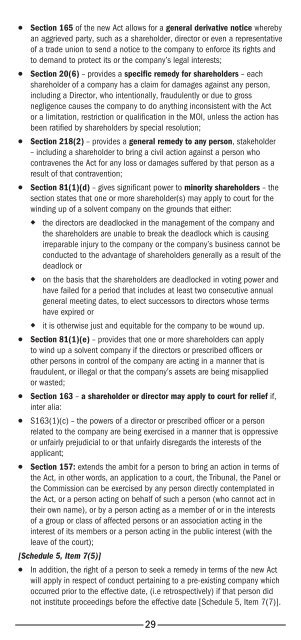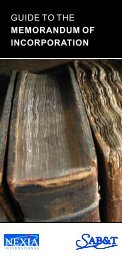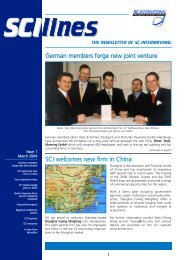DIRECTOR'S GUIDE 2011
DIRECTOR'S GUIDE 2011
DIRECTOR'S GUIDE 2011
Create successful ePaper yourself
Turn your PDF publications into a flip-book with our unique Google optimized e-Paper software.
●●●●●●●●●●●●●●●●Section 165 of the new Act allows for a general derivative notice wherebyan aggrieved party, such as a shareholder, director or even a representativeof a trade union to send a notice to the company to enforce its rights andto demand to protect its or the company’s legal interests;Section 20(6) – provides a specific remedy for shareholders – eachshareholder of a company has a claim for damages against any person,including a Director, who intentionally, fraudulently or due to grossnegligence causes the company to do anything inconsistent with the Actor a limitation, restriction or qualification in the MOI, unless the action hasbeen ratified by shareholders by special resolution;Section 218(2) – provides a general remedy to any person, stakeholder– including a shareholder to bring a civil action against a person whocontravenes the Act for any loss or damages suffered by that person as aresult of that contravention;Section 81(1)(d) – gives significant power to minority shareholders – thesection states that one or more shareholder(s) may apply to court for thewinding up of a solvent company on the grounds that either:◆◆◆◆◆◆the directors are deadlocked in the management of the company andthe shareholders are unable to break the deadlock which is causingirreparable injury to the company or the company’s business cannot beconducted to the advantage of shareholders generally as a result of thedeadlock oron the basis that the shareholders are deadlocked in voting power andhave failed for a period that includes at least two consecutive annualgeneral meeting dates, to elect successors to directors whose termshave expired orit is otherwise just and equitable for the company to be wound up.Section 81(1)(e) – provides that one or more shareholders can applyto wind up a solvent company if the directors or prescribed officers orother persons in control of the company are acting in a manner that isfraudulent, or illegal or that the company’s assets are being misappliedor wasted;Section 163 – a shareholder or director may apply to court for relief if,inter alia:S163(1)(c) – the powers of a director or prescribed officer or a personrelated to the company are being exercised in a manner that is oppressiveor unfairly prejudicial to or that unfairly disregards the interests of theapplicant;Section 157: extends the ambit for a person to bring an action in terms ofthe Act, in other words, an application to a court, the Tribunal, the Panel orthe Commission can be exercised by any person directly contemplated inthe Act, or a person acting on behalf of such a person (who cannot act intheir own name), or by a person acting as a member of or in the interestsof a group or class of affected persons or an association acting in theinterest of its members or a person acting in the public interest (with theleave of the court);[Schedule 5, Item 7(5)]●●In addition, the right of a person to seek a remedy in terms of the new Actwill apply in respect of conduct pertaining to a pre-existing company whichoccurred prior to the effective date, (i.e retrospectively) if that person didnot institute proceedings before the effective date [Schedule 5, Item 7(7)].29




